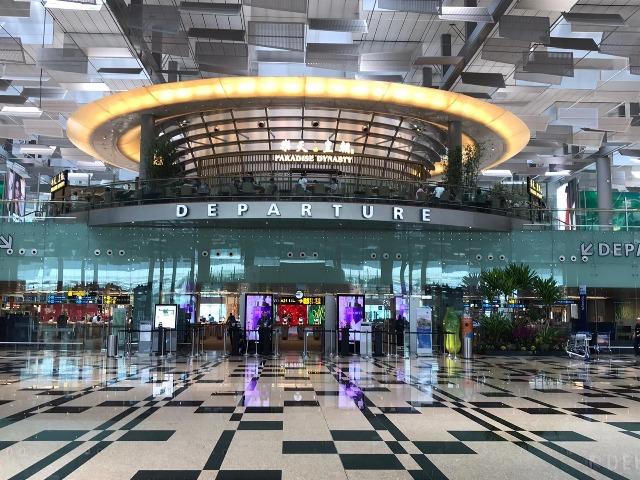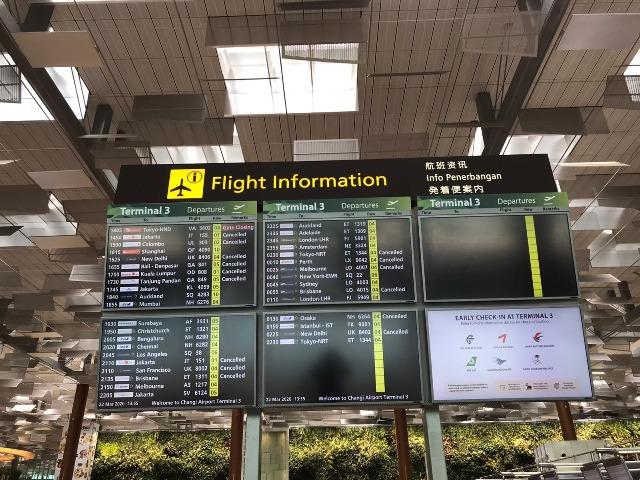Singapore to close borders starting before midnight of March 23; OFWs, kin affected
SINGAPORE - In a drastic move to curb the rising number of imported cases of COVID-19, Singapore said it will close its borders to all short-term visitors beginning late Monday, March 23.
The ban will start at 23:59 p.m. on March 23. Entry and even transit through the island city-state will be prohibited, according to Member of Parliament Lawrence Wong, co-chair of the Multi-Ministry Task Force.
Only workers in sectors offering essential services such as healthcare and transport will be allowed entry.
“In light of the rapidly escalating virus outbreak around the world, we have decided to significantly tighten our borders. We will disallow all short-term visitors from anywhere in the world to enter or transit through Singapore. We will also limit returning work pass holders to only those providing essential services like healthcare and transport,” Wong said in a video message posted on Gov.Sg's YouTube channel.
Wong mentioned that the border closure is a very significant move “especially for a small open economy like Singapore that has always been connected to the world.”
He stressed the pandemic is an unprecedented crisis and the government needed to put in place measures “to keep our borders safe, to limit the number of new imported cases and importantly, to conserve our resources to focus on returning Singaporeans.”
Flights have been canceled at the usually busy Changi Airport. Citizens have been strongly discouraged from flying out of the country after imported cases have multiplied.

Singapore residents who insist on traveling should be ready to face consequences, according to Ministry of Health’s advisory.

The Ministry of Manpower also clarified the government will only allow entry and return of work pass holders including their dependents for those providing essential services such as healthcare and transport. This is the most impactful as many work pass holders are still stranded overseas.
OFWs affected
Rain (real name withheld upon request), an overseas Filipino worker in Singapore, shared the impact of the directive to her as an OFW and her not being able to visit her six-month old baby who is with relatives in the Philippines.
“Malaking impact siya sa buhay ko kasi meron akong anak at hindi ako makauwi sa atin at hindi rin sila makapunta dito. May mga kinansel na din ako na mga pag-uwi sana sa atin kasi binibigyan na kami ng direction na huwag nang umuwi pansamantala,” she said.
Rain also shared how the border closure affects her workplace.
“Medyo malaki 'yung impact niya kasi may mga tao kasi na nasa atin pa sa Pilipinas na naipit na pabalik sana dito para sa trabaho. Medyo madami din kami, hindi lang naman 'yung mga uuwi ng Pilipinas, pati 'yung ibang bansa under ASEAN like Malaysia, Thailand," she said.
"May mga kasamahan din kami na hindi nga makabalik dahil sa bagong directive,” Rain disclosed.
This extreme tightening came a day after Singapore confirmed two deaths due to COVID-19 on Saturday, March 21, the first fatalities since the city-state first had its case in January. They were both in the Intensive Care Unit of the National Center for Infectious Diseases prior to their demise.
The first death is Case 90, a 75-year-old female Singaporean citizen who was in the ICU for 26 days and had a history of chronic heart disease and hypertension. The other fatality is Case 212, a male Indonesian national who entered Singapore after getting hospitalized in Indonesia for pneumonia. He was also in the ICU for 9 days and had a history of heart disease.
Dr. Eugene Macalinga, lecturer at the National University of Singapore’s Yong Loo Lin School of Medicine, talked about the significance of the two deaths which is one of the major reasons why the border is now closed.
“The latest this weekend is that for the first time, the Ministry of Health announced two deaths related to COVID-19. This in a way is sad news for Singapore because since we had our first confirmed case in January, this is the first time we are reporting deaths. Local transmission is down but imported cases are high," he said.
“This is a testament to the Singapore health care system and I guess they have been working hard since Day 1. They have good health care, they have good treatment protocol," Macalinga added.
"If you look into the details of these two deaths in Singapore, they are elderly and have comorbidity. So for Singapore to be able to manage no fatality for about two months, that’s a very good record. And I think that’s why WHO (World Health Organization) praised Singapore for the handling and management and control of COVID-19," he said.
According to Dr. Macalinga, “[Filipinos] are generally calm but they are cautious and follow the rules in their host countries.”
In total, there are now 455 cases in Singapore, 144 of whom have been discharged based on MOH’s March 22 update. There are 23 new cases, 18 of whom are imported cases. Such imported cases have overtaken the cases of local transmission.
Meanwhile, one more Filipino, referred to in the Ministry of Health’s records as Case 394, was added to the list of COVID-19. Case 394 is a 66-year-old female long-term pass holder. She is considered to be an imported case with travel history from the Philippines. The patient is currently isolated at the Changi General Hospital based on Singapore’s Ministry of Health’s March 21 Update.
To date, there are 14 total cases of Filipinos diagnosed with the novel coronavirus, the first three of whom (Case 89, 102, 108) have been discharged. —KG, GMA News




